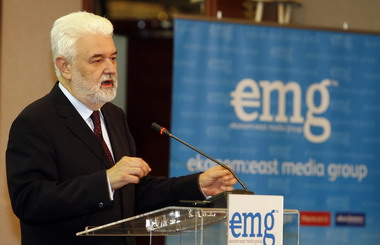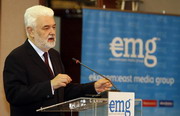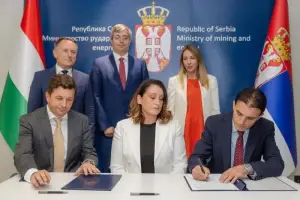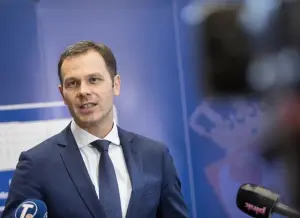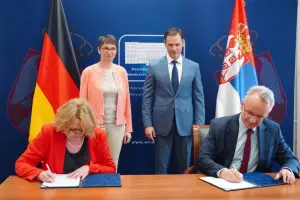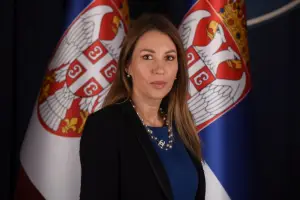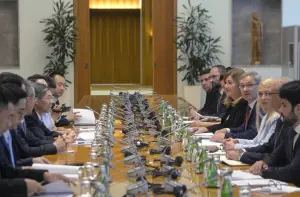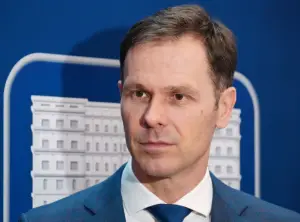Q:
A:
Serbia’s 2010 economic growth 1.5%
Belgrade,
6 October 2010
Serbian Prime Minister Mirko Cvetkovic stated today that this year Serbia will most certainly attain economic growth of 1.5%, adding that when projecting the 2011 budget, the government will not be more restrictive than before, but will remain within the limits agreed on with the IMF.
Speaking at a roundtable discussion, organised by the Economist Media Group, Cvetkovic underlined that Serbia will achieve the projected economic growth of 1.5% for 2010 and possibly even a little higher.
Last year’s government measures yielded positive effects on the movement of GDP, the Prime Minister recalled, adding that Serbia is recovering more quickly than other countries in the region.
Before the crisis, GDP growth was based on increased domestic demand, which was unsustainable in the long run, he stated.
Since the crisis showed that the current growth model cannot be maintained, we must find a new model which implies higher production and exports, the Prime Minister explained.
Early in 2010 exports rose monthly by 20% on average, Cvetkovic affirmed, adding that in the second half of the year it somewhat declined to around 16%.
It is vital to maintain an inflation rate within the projected parameters – of 6% plus-minus 2% – and in this sense there has to be a restrictive monetary policy, he observed.
As for medium-term budget projections, we should be oriented towards capital investment rather than to current spending, he said, noting that the two goals overlap because the state must ensure a better life for those who bore a portion of the burden during the crisis when their salaries were frozen.
Cvetkovic recalled that it was agreed with the IMF that the budget deficit in 2011 should be reduced from 4.8% in total GDP to 4%.
Minister of Energy and Mining Petar Skundric declared at the discussion that the low electricity pricing is a major issue in Serbia’s energy sector, noting that this should be close to the lowest price in the region, in this case that of Bulgaria.
Skundric remarked that there is room for electricity prices to be increased, but bearing in mind citizens’ low solvency and for the sake of the competitiveness of the Serbian economy, the hike should not be a hefty one.
He underscored that over the next four to five years around €2 billion will be invested in the gas sector, of which €1.4 billion will be allocated for the South Stream project and the underground gas storage facility, while the remaining funds will be invested in a national gasification programme and Serbia’s inter-connection with neighbouring countries.
As for the oil sector, the Minister voiced his expectation that the oil industry Naftna Industrija Srbije will not be in the red this year, outlining that over the next two years, the company is to invest €560 million in the modernisation of production at the Pancevo refinery.
State Secretary of Economy and Regional Development Nebojsa Ciric confirmed that since the beginning of the year a total of 145,000 consumer loans, worth €220 million, have been approved to citizens.
He added that loans under favourable terms have helped citizens to overcome the crisis, announcing the possible abolishment of certain programmes next year, which refer to subsidised loans, bearing in mind that as of 1 January 2010 public sector salaries and pensions will be unfrozen.
Support to the car and construction industries will continue, he added.
Ciric highlighted the encouraging fact that the placement of investment loans this year has increased and that over 1,000 companies received €126 million, which by far exceeds the amount in 2009, which stood at a mere €2 million.
Last year’s government measures yielded positive effects on the movement of GDP, the Prime Minister recalled, adding that Serbia is recovering more quickly than other countries in the region.
Before the crisis, GDP growth was based on increased domestic demand, which was unsustainable in the long run, he stated.
Since the crisis showed that the current growth model cannot be maintained, we must find a new model which implies higher production and exports, the Prime Minister explained.
Early in 2010 exports rose monthly by 20% on average, Cvetkovic affirmed, adding that in the second half of the year it somewhat declined to around 16%.
It is vital to maintain an inflation rate within the projected parameters – of 6% plus-minus 2% – and in this sense there has to be a restrictive monetary policy, he observed.
As for medium-term budget projections, we should be oriented towards capital investment rather than to current spending, he said, noting that the two goals overlap because the state must ensure a better life for those who bore a portion of the burden during the crisis when their salaries were frozen.
Cvetkovic recalled that it was agreed with the IMF that the budget deficit in 2011 should be reduced from 4.8% in total GDP to 4%.
Minister of Energy and Mining Petar Skundric declared at the discussion that the low electricity pricing is a major issue in Serbia’s energy sector, noting that this should be close to the lowest price in the region, in this case that of Bulgaria.
Skundric remarked that there is room for electricity prices to be increased, but bearing in mind citizens’ low solvency and for the sake of the competitiveness of the Serbian economy, the hike should not be a hefty one.
He underscored that over the next four to five years around €2 billion will be invested in the gas sector, of which €1.4 billion will be allocated for the South Stream project and the underground gas storage facility, while the remaining funds will be invested in a national gasification programme and Serbia’s inter-connection with neighbouring countries.
As for the oil sector, the Minister voiced his expectation that the oil industry Naftna Industrija Srbije will not be in the red this year, outlining that over the next two years, the company is to invest €560 million in the modernisation of production at the Pancevo refinery.
State Secretary of Economy and Regional Development Nebojsa Ciric confirmed that since the beginning of the year a total of 145,000 consumer loans, worth €220 million, have been approved to citizens.
He added that loans under favourable terms have helped citizens to overcome the crisis, announcing the possible abolishment of certain programmes next year, which refer to subsidised loans, bearing in mind that as of 1 January 2010 public sector salaries and pensions will be unfrozen.
Support to the car and construction industries will continue, he added.
Ciric highlighted the encouraging fact that the placement of investment loans this year has increased and that over 1,000 companies received €126 million, which by far exceeds the amount in 2009, which stood at a mere €2 million.

